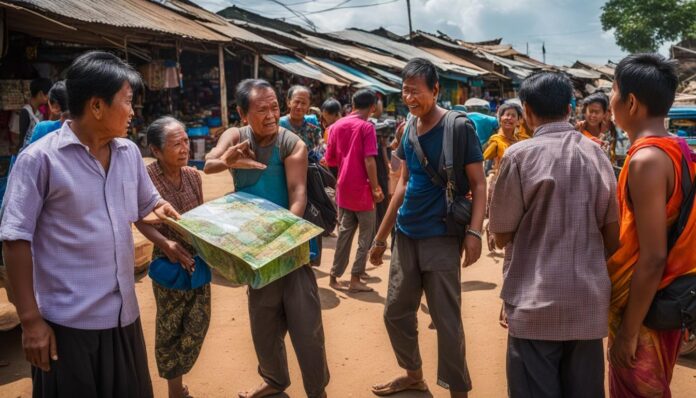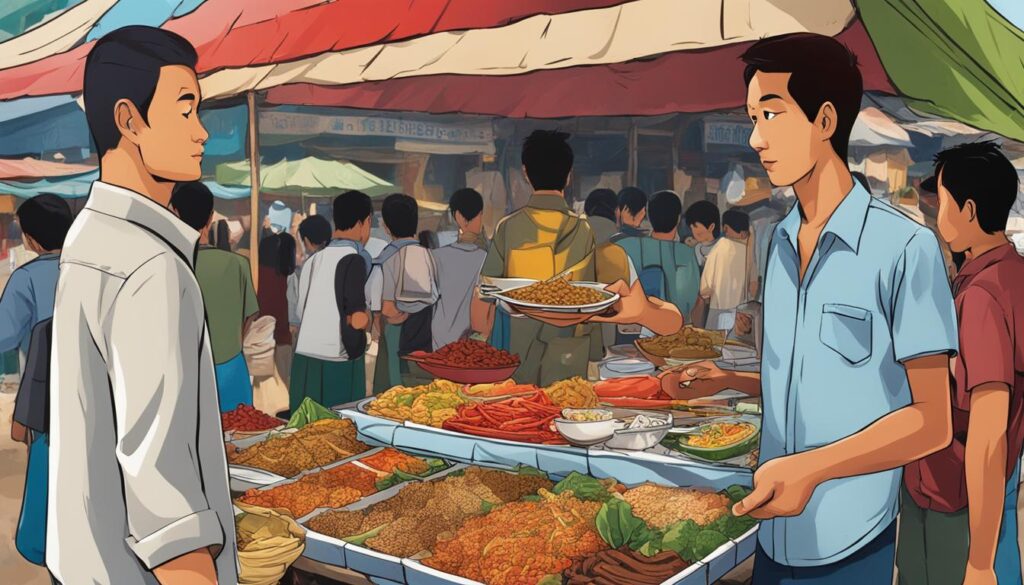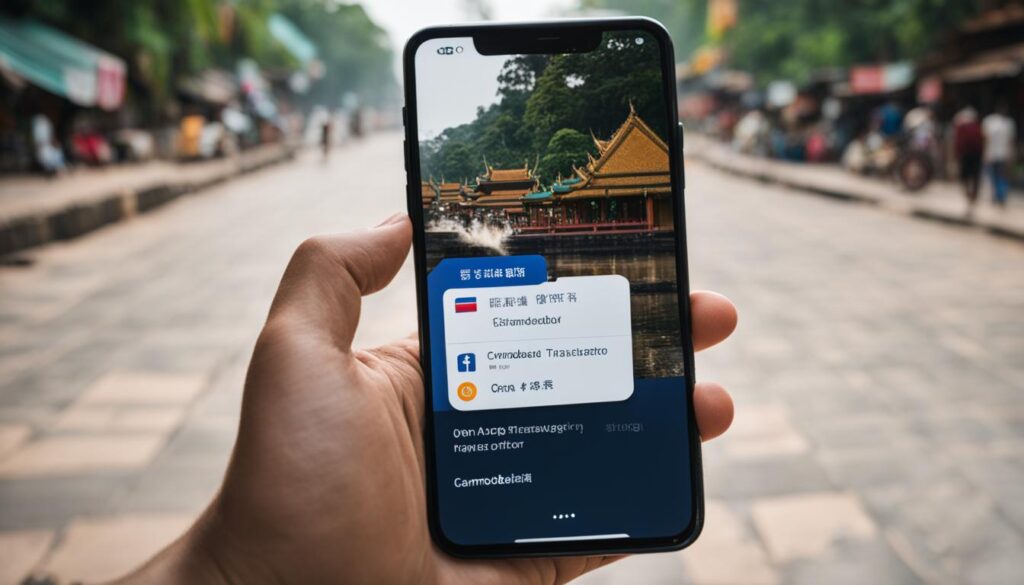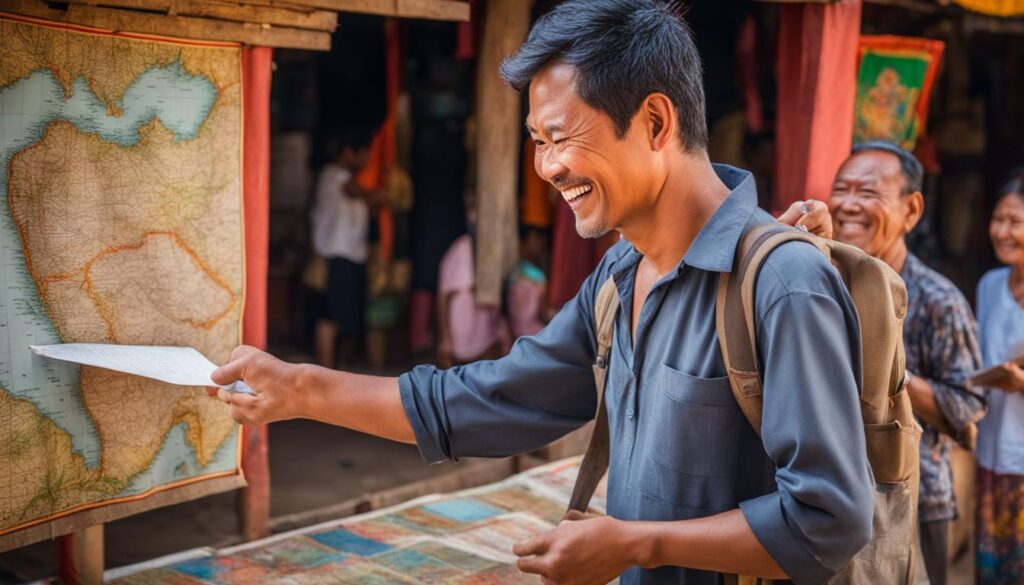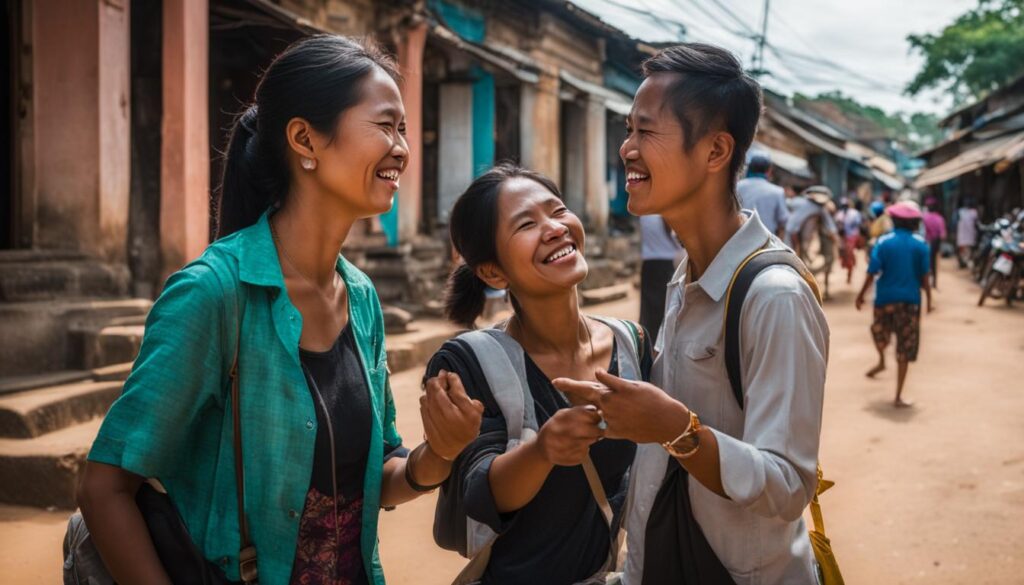If you’re planning a trip to Cambodia, you may be worried about the language barrier you’ll encounter. Communicating with locals can be challenging, especially if you don’t speak the official language, Khmer. However, don’t let this language barrier hold you back from experiencing the beauty of Cambodia and its people. In this section, we’ll provide you with effective strategies for overcoming language barriers while traveling in Cambodia. You’ll discover practical tips and solutions to ensure smooth communication during your trip. From language learning resources to non-verbal communication techniques, we’ll equip you with the knowledge you need to navigate language challenges and enjoy a more immersive travel experience.
Understanding the Language Landscape in Cambodia
Cambodia is a country with a rich linguistic history, and before traveling there, it’s crucial to understand the languages spoken there for effective communication.
The official language of Cambodia is Khmer, spoken by approximately 90% of the population. Although English is not widely spoken in Cambodia, you can find more English-speakers in urban areas and tourist hotspots, such as Phnom Penh, Siem Reap, and Sihanoukville.
It’s a good idea to learn some Khmer phrases, even if they’re just basic ones. You can find language learning resources and guides online, such as Khmer Language guidebook by Kamsot Aby and video tutorials on YouTube.
Language Landscape in Cambodia
| Language | Spoken by | Percent of population |
|---|---|---|
| Khmer | Cambodians | 90% |
| French | Older generation, government officials | 5% |
| English | Urban population, tourism industry | Less than 1% |
Although knowing some basic phrases in Khmer can be helpful, don’t worry if you’re struggling to communicate. Many Cambodians are patient and willing to help.
“Cambodians are very warm and friendly people. They will understand your struggles and make an effort to communicate with you.”
In the next section, we’ll provide you with some useful Khmer phrases to help you overcome language barriers during your travels.
Useful Phrases for Surviving the Language Barrier
When traveling in Cambodia, language barriers can be a major obstacle to effective communication. However, learning a few key phrases can go a long way in helping you navigate basic conversations. Here are some essential phrases in Khmer to add to your repertoire:
| English | Khmer |
|---|---|
| Hello | សួស្តី |
| Thank you | អរគុណ |
| Yes | បាទ/បាទី |
| No | ទេ |
| I don’t understand | ខ្ញុំ មិន យល់ ពីរបៀបនេះ ទេ |
| How much does it cost? | តើវា អត់ធ្មត់ ប៉ុណ្ណោះ? |
| Can you help me? | អ្នក អាច ជួយ ខ្ញុំបាន ទេ ឬ? |
| Where is the restroom? | ប្រអប់ ទេសនៅ កណ្តាល ណា? |
These phrases can be used in a variety of situations, from greetings to ordering food. Memorizing them can help you feel more confident and comfortable during your travels in Cambodia. Don’t be afraid to practice and use them whenever necessary!
If you prefer to have a guide with you, there are many translation apps available, such as Google Translate or iTranslate. Just be sure to download them before you leave for your trip.
Embracing Technology: Language Translator Apps
Language barriers can be a significant hurdle when traveling, but technology has made great strides in making communication more accessible. Language translator apps can be incredibly helpful tools, allowing you to quickly and accurately translate words and phrases in real-time.
Some popular language translator apps that can help you navigate conversations in Cambodia include Google Translate, iTranslate, and TripLingo. These apps allow you to input text or speak into your device’s microphone to receive an immediate translation. Plus, many apps also offer the ability to save frequently used phrases for easy access.
When using language translator apps, it’s important to keep in mind that they may not always be 100% accurate, especially for more complex sentences or concepts. Be sure to double-check the translation with a native speaker or use simple, direct phrases for greater clarity.
Tips for Using Language Translator Apps Effectively:
- Choose an app with offline capabilities, as internet access may be limited in certain areas of Cambodia.
- Practice using the app before your trip to become familiar with its features and functionality.
- Be mindful of speaking slowly and clearly when using voice-to-text functionality for greater accuracy.
- Maintain eye contact and engage in active listening during conversations, even if using a translator app.
“Language translator apps have revolutionized the way we communicate while traveling, but they should be used as a supplement to, not a replacement for, genuine interaction and cultural immersion.”
Building Bridges through Non-Verbal Communication
Effective communication is not just about speaking the same language. When traveling to Cambodia, non-verbal communication techniques can also be crucial to understanding and being understood. Learning to read body language, gestures, and facial expressions can help you convey your message more clearly, even if you are not speaking the same language.
For example, a smile is universally recognized as a friendly gesture, while a nod of the head can indicate agreement or understanding. Pointing to objects or using hand gestures can also help you communicate basic information, such as directions or the price of an item. Additionally, using visual aids like maps or pictures can help bridge the language gap.
However, it’s important to keep in mind that certain gestures or body language may have different meanings in Cambodia than they do in your home country. Take some time to research the local culture and customs to avoid any misunderstandings.
Remember, effective communication is about more than just speaking the same language. By utilizing non-verbal communication techniques, you can build bridges and connect with locals in meaningful ways.
Cultivating Cultural Sensitivity in Communication
When traveling in Cambodia, it’s important to be aware of cultural nuances and to respect local customs. By doing so, you can enhance your communication experience and avoid misunderstandings while interacting with locals.
Some tips for being culturally sensitive include:
- Research the customs and traditions of the areas you plan to visit.
- Take the time to learn some basic Khmer phrases and use them when appropriate.
- Avoid making assumptions or comments that could be taken as disrespectful or offensive.
- Be aware of your body language and tone of voice, which can convey different meanings in different cultures.
Respecting Local Customs
In Cambodia, it’s important to remember that public displays of affection are generally frowned upon and that modest dress is appreciated, especially when visiting religious sites. Removing your shoes before entering someone’s home is also a common practice.
When dining with locals, wait to be invited to sit and begin eating, and use your right hand to eat and pass food. It is considered impolite to touch someone’s head or feet, so be mindful of your gestures.
| Tip: | Show interest in the culture and ask locals about their customs and traditions. By doing so, you can not only improve your communication but also gain a deeper understanding and appreciation of the country and its people. |
|---|
Language Exchange Programs in Cambodia
Engaging in language exchange programs can provide you with a unique opportunity to learn Khmer and immerse yourself in the local culture. Cambodia offers several language exchange programs that cater to both group and individual learners. These programs can help you develop your language skills by providing you with an opportunity to practice with native speakers.
One popular program is the Khmer Language Partner program offered by the Language Learning Center. This program matches learners with native Khmer speakers and provides a structured learning environment where you can practice speaking, reading, and writing in Khmer. The center also organizes cultural exchange activities to enhance your learning and give you a deeper insight into the local culture.
Another option is the Volunteer in Cambodia program, where you can volunteer your time to teach English or other subjects to local students while also learning Khmer. This program allows you to fully immerse yourself in the local culture and develop meaningful relationships with the people you meet.
Sample of Language Exchange Programs in Cambodia:
| Program | Details |
|---|---|
| Khmer Language Partner | Individual and group sessions with native Khmer speakers, cultural exchange activities, and flexible scheduling. |
| Volunteer in Cambodia | Teach English or other subjects to local students while also learning Khmer. Expected to work a minimum of 20 hours per week. Program fees start at $500 for one month. |
| Friends for Asia | Language and cultural immersion program, volunteer teaching opportunities, homestay options, and excursions. Program fees start at $950 for two weeks. |
Each program offers a unique experience and varies in terms of cost, duration, and level of immersion. Researching and comparing different language exchange programs can help you find the one that best suits your needs and interests.
Seeking Assistance from Locals and Tour Guides
When facing language barriers while traveling in Cambodia, don’t hesitate to seek help from locals or tour guides. They can offer invaluable assistance and local knowledge to help you navigate and communicate effectively.
Language barrier solutions are not always found through technology or language learning resources. Occasionally, it’s best to rely on human interaction to help you overcome communication challenges. Cambodians are known for their hospitality and willingness to assist foreign visitors. To avoid misunderstandings, it’s recommended that you approach them politely and respectfully.
If you’re staying in a guesthouse or hotel, ask the staff for help with translation or to recommend additional resources for language assistance. Additionally, tour guides are an excellent resource, especially if they speak both Khmer and English. They can help translate during tours and help you communicate with locals, ensuring a more enriching and immersive travel experience.
“Language learning resources are not always enough to overcome communication difficulties. Sometimes, all it takes is a little help from someone who knows the language and culture well.”
Adapting to the Local Communication Style
Communication is key to any travel experience, and understanding the communication style in Cambodia can help bridge the gap between cultures. As a visitor, adapting to the local communication style can help you connect with locals and navigate everyday interactions more smoothly. Here are some communication tips for traveling in Cambodia:
Cultural Differences
It’s essential to recognize that Cambodia has its own unique cultural differences that impact communication. For example, in Cambodia, indirect communication and saving face are valued highly, so locals may not always say what they really mean. It’s essential to be aware of these cultural nuances and be patient when communicating with locals.
Body Language
In Cambodia, body language is an important aspect of non-verbal communication. A smile or a nod can go a long way in creating a positive interaction. Additionally, making direct eye contact and maintaining an upright posture shows respect and attentiveness.
Respect and Courtesy
Respect and courtesy are highly valued in Cambodia, especially when addressing elders or those in authority. It’s important to address them with the appropriate titles, such as “Lok” for men and “Lok Srey” for women. Additionally, showing gratitude through “Arkoun” (Thank You) can go a long way in creating a rapport with locals.
Using an Interpreter
If you’re struggling with communication, using an interpreter can be immensely helpful. Tour guides and language exchange students can provide assistance and help you navigate conversations. Additionally, language translator apps like Google Translate can also help in translating phrases.
Adapting to the communication style in Cambodia takes time and patience, but it can greatly enhance your travel experience. With these tips, you can improve your communication skills and connect with locals more effectively.
Embracing Patience and Empathy
When it comes to communicating effectively in a foreign country like Cambodia, patience and empathy are crucial. It’s natural to feel frustrated or overwhelmed when struggling to convey your message or understand someone else’s. However, approaching communication challenges with understanding and respect can go a long way in fostering positive connections and creating memorable experiences.
One key to being patient and empathetic is to recognize that language barriers are a two-way street. Just as you may be struggling to understand the locals, they may feel just as frustrated trying to communicate with you. Keep an open mind and try to put yourself in their shoes. With patience and a willingness to listen and learn, you can overcome language barriers and forge meaningful connections.
Another way to practice patience and empathy is to embrace non-verbal communication. As we explored in Section 5, body language, gestures, and visual aids can be powerful tools for conveying meaning and emotion when language falls short. By being observant and attuned to these non-verbal cues, you can enhance your understanding and ability to communicate.
Remember, effective communication is not just about speaking the same language, but also about building rapport and understanding. By embracing patience and empathy, you can create a more meaningful and fulfilling travel experience in Cambodia.
Enhancing Your Language Skills for Future Travels
Learning a new language is a valuable asset that can enrich your travel experiences and broaden your horizons. The ability to communicate effectively with locals can not only help you avoid misunderstandings but also foster meaningful connections. Here are some language learning resources that can help you enhance your linguistic abilities:
- Duolingo: This popular language learning app is free and offers courses for over 30 languages, including Khmer. With its user-friendly interface and gamified approach to learning, you can easily fit language practice into your daily routine.
- Rosetta Stone: A well-known language learning program that provides immersive experiences in the language of your choice. Although it comes at a cost, it’s a great investment for serious language learners.
- Language Exchange Programs: Apart from language exchange programs in Cambodia, enrolling in local language courses in your own community or finding a language exchange partner online can provide you with consistent practice and feedback.
Remember, learning a language is never easy, but it’s always worth the effort. Whether you plan on traveling to Cambodia again or another destination, expanding your linguistic abilities can lead to more enriching and immersive travel experiences.
Conclusion
In conclusion, overcoming language barriers while traveling in Cambodia can be challenging, but it’s not impossible. By utilizing strategies such as language learning resources, translator apps, and cultural sensitivity, you can communicate effectively and make meaningful connections with locals.
Remember to embrace patience and empathy when facing communication challenges and seek assistance from locals and tour guides when needed. Additionally, adapting to the local communication style and enhancing your language skills can not only improve your experience in Cambodia but also prepare you for future travels.
With the right mindset and techniques, you can navigate language barriers and fully immerse yourself in the rich culture and experiences that Cambodia has to offer. Happy travels!




























